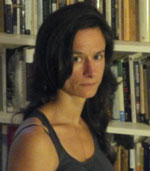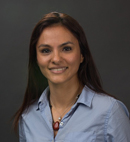Meet the Faculty
Dr. Gustavo Lopez, Department of Chemistry
Research interests
 My research group has been working in the development and application of computational techniques to describe systems in condensed phase. Examples of such systems are atomic and molecular nanostructured materials, confined fluids, polymeric materials, and proton wires. In recent years, we have been working in the computational study of biomolecular systems in different biological environments.
My research group has been working in the development and application of computational techniques to describe systems in condensed phase. Examples of such systems are atomic and molecular nanostructured materials, confined fluids, polymeric materials, and proton wires. In recent years, we have been working in the computational study of biomolecular systems in different biological environments.
Dr. Tom Kurtzman, Department of Chemistry
Research interests
 My research focuses on applying statistical mechanical methods and computer simulations to explore the solvation of complex biological surfaces and to understand the relevance of this solvation to biological processes. In particular, my group studies systems that can shed light on the physical principles that govern the recognition of small molecule ligands with proteins. The fundamental aim of this research is to develop computational methodologies and analytic tools that can be used to aid the rational discovery and design of new drugs.
My research focuses on applying statistical mechanical methods and computer simulations to explore the solvation of complex biological surfaces and to understand the relevance of this solvation to biological processes. In particular, my group studies systems that can shed light on the physical principles that govern the recognition of small molecule ligands with proteins. The fundamental aim of this research is to develop computational methodologies and analytic tools that can be used to aid the rational discovery and design of new drugs.
Dr. Joseph Rachlin, Department of Biological Sciences
Research interests
 The long-range activities of my laboratory are to understand the phylogenetic relationships, interactions, and general life histories of both freshwater and marine aquatic organisms.Among the techniques employed are the use of cytogenetics in studies of the interrelationships of monophyletic genera and species, mathematical models for evaluating population dynamics and life histories, and the development of new approaches for the understanding of resource partitioning in aquatic environments. We will also be exploring the use of high-end computer graphics for studies of the comparative morphology of aquatic organisms, and to develop virtual models for studies of form and function.
The long-range activities of my laboratory are to understand the phylogenetic relationships, interactions, and general life histories of both freshwater and marine aquatic organisms.Among the techniques employed are the use of cytogenetics in studies of the interrelationships of monophyletic genera and species, mathematical models for evaluating population dynamics and life histories, and the development of new approaches for the understanding of resource partitioning in aquatic environments. We will also be exploring the use of high-end computer graphics for studies of the comparative morphology of aquatic organisms, and to develop virtual models for studies of form and function.
Dr. Stephen Redenti, Department of Biological Sciences
Research interests
 The loss of neural retina due to trauma or degenerative diseases like retinitis pigmentosa or age-related macular degeneration is a tragic and largely untreatable problem. Stem cell transplantation may someday be used to repair the damaged retina. Previous work has isolated embryonic stem cells and retinal progenitor cells, grafted these cells into diseased host retina, and demonstrated new cell incorporation into host retina. Using a tissue-engineering approach, stem cells can be combined with biodegradable polymers to increase survival for improved delivery during transplantation. The goal of our research is to further develop practical cell replacement strategies for repair of damaged retinal and other neural tissue.
The loss of neural retina due to trauma or degenerative diseases like retinitis pigmentosa or age-related macular degeneration is a tragic and largely untreatable problem. Stem cell transplantation may someday be used to repair the damaged retina. Previous work has isolated embryonic stem cells and retinal progenitor cells, grafted these cells into diseased host retina, and demonstrated new cell incorporation into host retina. Using a tissue-engineering approach, stem cells can be combined with biodegradable polymers to increase survival for improved delivery during transplantation. The goal of our research is to further develop practical cell replacement strategies for repair of damaged retinal and other neural tissue.
Dr. Moira Sauane, Department of Biological Sciences
Research interests
 Cancer represents a significant worldwide public health problem. The development of new anti-cancer therapeutic agents and strategies for cancer treatment and diagnosis to combat this terrible disease is therefore of paramount importance. The next generation of cancer therapies is aimed at specifically targeting cancer cells. One such approach is known as gene therapy, and involves inserting genes into individual cells to manipulate or selectively destroy cancer cells. In order to develop an effective gene therapy to treat cancer, more needs to be known about the individual molecules that inhibit tumor growth. In my lab, we aim to discover the precise molecular mechanisms by which cancer-therapeutic agents selectively kill cancer cells. Importantly, the molecules we study are also involved in immunomodulatory and antiangiogenic processes, properties that can also be harnessed to fight cancer. This type of approach is essential to producing cutting-edge therapies that are safer and more effective than current cancer treatments.
Cancer represents a significant worldwide public health problem. The development of new anti-cancer therapeutic agents and strategies for cancer treatment and diagnosis to combat this terrible disease is therefore of paramount importance. The next generation of cancer therapies is aimed at specifically targeting cancer cells. One such approach is known as gene therapy, and involves inserting genes into individual cells to manipulate or selectively destroy cancer cells. In order to develop an effective gene therapy to treat cancer, more needs to be known about the individual molecules that inhibit tumor growth. In my lab, we aim to discover the precise molecular mechanisms by which cancer-therapeutic agents selectively kill cancer cells. Importantly, the molecules we study are also involved in immunomodulatory and antiangiogenic processes, properties that can also be harnessed to fight cancer. This type of approach is essential to producing cutting-edge therapies that are safer and more effective than current cancer treatments.
Dr. Donna McGregor, Department of Chemistry
Research interests
 In my research group we believe in the importance of creative and innovative science. My group is comprised exclusively of undergraduate students and we make use of a team-based collaborative approach to studying chemistry. Our research focus is split into 3 main areas: 1. The synthesis and characterization of metal tri-peptides where our goal is to develop an understanding of the way the metals rhenium and technetium bind to simple L- and D-amino acid tripeptides to help advance the development of radiotherapuetic drugs for the treatment of cancer. 2. The integration of chemistry and the arts where specific project design is driven by the artist we are working with. 3. The synthesis and characterization of polyoxometalates as metal oxides to study the chemistry and redox stability of transition metals.
In my research group we believe in the importance of creative and innovative science. My group is comprised exclusively of undergraduate students and we make use of a team-based collaborative approach to studying chemistry. Our research focus is split into 3 main areas: 1. The synthesis and characterization of metal tri-peptides where our goal is to develop an understanding of the way the metals rhenium and technetium bind to simple L- and D-amino acid tripeptides to help advance the development of radiotherapuetic drugs for the treatment of cancer. 2. The integration of chemistry and the arts where specific project design is driven by the artist we are working with. 3. The synthesis and characterization of polyoxometalates as metal oxides to study the chemistry and redox stability of transition metals.
Dr. Prabodhika Mallikaratchy, Department of Chemistry
Research interests
 We are interested developing novel targeted therapeutic agents based on DNA aptamers against cancer and autoimmune disorders. DNA aptamers are small DNA sequences (typically <80mer), which can fold into 3-dimentional structures. These folded DNA aptamer structures have the ability to specifically recognize epitopes on receptor proteins expressed on membrane proteins in cancer cells. The method of selecting aptamers is called systematic evolution of ligands by exponential enrichment (SELEX). Our laboratory is focused on two major areas of aptamer research: 1. Investigation of novel SELEX technologies to select aptamers against biologically important cellular targets specifically expressed in cancer cells. 2. Design and synthesis of novel multivalent, multifunctional aptamer scaffolds for biomedical applications. We are also interested in structure-activity relationships of monomeric and multimeric aptamers.
We are interested developing novel targeted therapeutic agents based on DNA aptamers against cancer and autoimmune disorders. DNA aptamers are small DNA sequences (typically <80mer), which can fold into 3-dimentional structures. These folded DNA aptamer structures have the ability to specifically recognize epitopes on receptor proteins expressed on membrane proteins in cancer cells. The method of selecting aptamers is called systematic evolution of ligands by exponential enrichment (SELEX). Our laboratory is focused on two major areas of aptamer research: 1. Investigation of novel SELEX technologies to select aptamers against biologically important cellular targets specifically expressed in cancer cells. 2. Design and synthesis of novel multivalent, multifunctional aptamer scaffolds for biomedical applications. We are also interested in structure-activity relationships of monomeric and multimeric aptamers.
Renuka Sankaran
Research interests
My research interests include whole plant mineral nutrition and homeostasis, interaction of metal contaminants such as Cd with mineral nutrients in terms of ion transport, and the transfer of these minerals through the food chain. Research in the lab focuses on long distance translocation of inorganic ions via the xylem/phloem as well as short distance transport of these ions across various cellular and organellar membranes. The long term goal of this research is to help in developing strategies to enhance nutritional quality of plant foods while trying to mitigate Cd accumulation in these foods. Current research incorporates different physiological, molecular and biochemical tools in trying to gain understanding of the different molecular signals regulating the partitioning of both the essential and non essential ions to edible tissues.
Naphtali O' Connor
Research interests
My current research focus is the development of materials for biomedical applications. We recently developed a method for preparing polysaccharide-polyamine crosslinked hydrogels. We are currently exploring their application as anti-microbial and wound healing materials. We are also working on the development of curcumin based biomaterials as antibacterial agents and cancer therapeutics.









